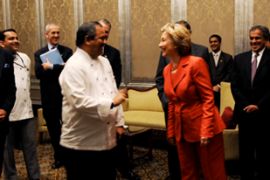Clinton pushes US-India trade ties
Defence and nuclear deals top US secretary of state’s agenda as she visits Mumbai.

The deal is worth an estimated $10bn and is part of India’s $30bn plan to modernise its military over the next five years.
Business meetings
In Mumbai, India’s commercial capital, Clinton met business leaders to discuss trade relations.
Clinton – who stayed at the Taj Mahal Palace hotel, the scene of last year’s attacks in Mumbai – met the hotel staff and signed a remembrance book at a function that was closed to the media.
Clinton said in an opinion piece published by the Times of India to coincide with her arrival on Friday: “We both seek a more secure world for our citizens.
“We should intensify our defence and law enforcement co-operation to that end.”
The visit is aimed at bolstering ties with New Delhi on trade, climate change policy and arms control.
Clinton is set to hold talks with Manmohan Singh, India’s prime minister, in New Delhi on Sunday.
Tensions persist
Clinton’s apparent effort to smooth ties between India and Pakistan comes amid continued tension between New Delhi and Islamabad.
Although Singh and Yusuf Raza Gilani, his Pakistani counterpart, agreed on Thursday to jointly fight terrorism, Singh has said that formal peace talks with Pakistan are still on hold.
India wants Pakistan to punish those responsible for the Mumbai attacks and stop armed groups from using its territory to carry out attacks in India before the peace talks, known as the composite dialogue, can resume.
“It only strengthens our stand that we wouldn’t like Pakistan to wait for the resumption of the composite dialogue … but take action against terrorist elements regardless of these processes that may lead to resumption,” Singh told parliament on Friday.
Washington is aiming to improve relations between India and Pakistan so that it can keep Pakistan’s army focused on fighting Taliban fighters based along its western border with Afghanistan.
But India was highly critical when a Pakistani court freed Hafiz Mohammad Saeed, the founder of Lashkar-e-Taiba, who is wanted for suspected involvement in the Mumbai assaults.
India has arrest warrants against 21 other Pakistanis over the attacks.